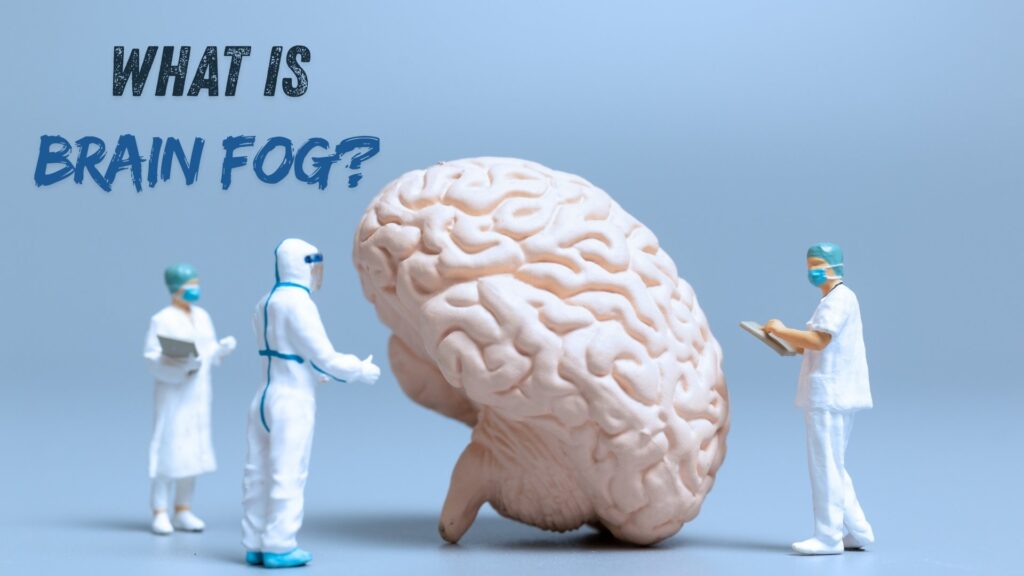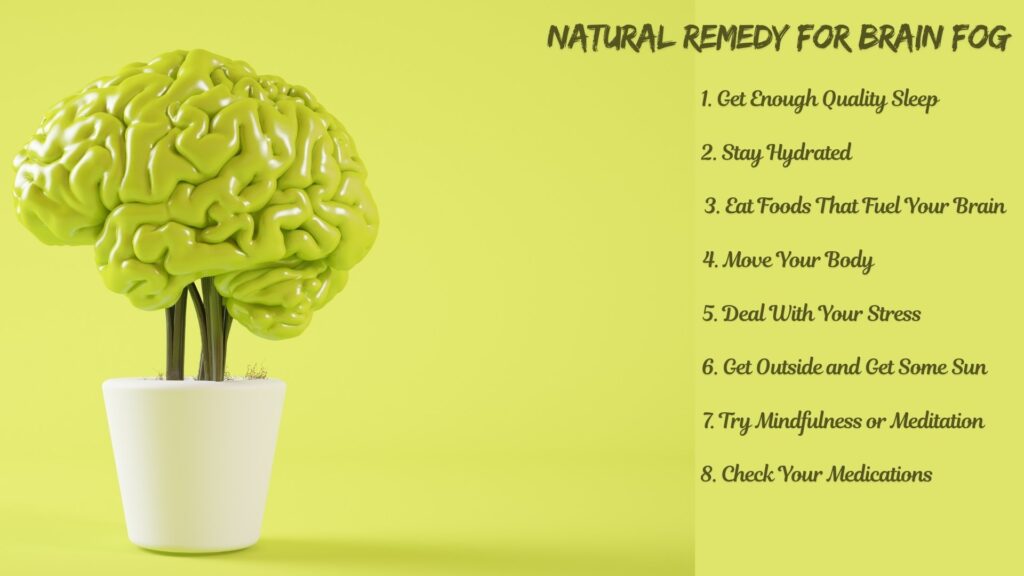Have you ever experienced one of those days where it feels like you’re living in a cloud? You’re staring at your computer screen, but your brain feels slow. You can’t remember names, you can’t find your keys, and your to-do list is a blur. This mental haze is commonly known as brain fog, and it’s more common than you might think. The good news? You don’t have to live with it. With the help of natural remedies for brain fog, you can regain clarity, improve focus, and feel like yourself again. If you’re looking for effective, lasting solutions, exploring these remedies is a powerful first step toward restoring your mental sharpness.
What Is Brain Fog?

Let’s start simple. Brain fog isn’t a disease. It’s not something you can see on a lab test. Instead, brain fog is a set of symptoms that make you feel mentally cloudy. You might notice:
- Trouble focusing or paying attention
- Forgetting things you normally remember
- Slow thinking or feeling spaced out
- Feeling tired—even after a full night’s sleep
- Hard time finding the right words
These feelings come and go. Sometimes they can last for weeks if you don’t address the root causes.
What Causes Brain Fog?
Your brain is like a car that needs fuel, rest, and care. When life feels out of balance—even just a little—your mind can start to feel foggy. These are some of the most common reasons why.
- Poor sleep or not enough rest
- Stress and anxiety
- Unhealthy food choices
- Dehydration
- Lack of exercise
- Blood sugar swings after eating snacks or sweets
- Certain medications or medical conditions, like thyroid issues
- Hormone changes (like menopause)
It’s not always just one thing. Often, brain fog comes from a mix of little things adding up over time.
Natural Remedy for Brain Fog
Now let’s get down to brass tacks. You don’t need a magic pill or a trendy diet supplement. You can just focus on simple, tried & true habits that will keep your mind working. If you’re wondering about a simple natural remedy for brain fog, many lifestyle adjustments—like hydration, sleep, and nutrition—can dramatically improve cognitive clarity.

1. Get Enough Quality Sleep
Think of sleep as a reset button for your brain. If you’re running on empty, it’s hard to stay focused. Set a bedtime and stick to it. Try to get seven to eight hours every night. Avoid screens before bed; read a book or listen to soft music to help your mind wind down.
2. Stay Hydrated
Even mild dehydration can make your thinking slow. Drink water during the day, not just when you’re thirsty. If plain water is boring, try flavoring it with a lemon wedge or some berries.
3. Eat Foods That Fuel Your Brain
Food is your brain’s power source. Some foods can help you think more clearly:
- Leafy greens: spinach, kale, and broccoli
- Berries: blueberries and strawberries are brain boosters
- Nuts and seeds: walnuts, almonds, pumpkin seeds
- Omega-3 rich fish: salmon, sardines, trout
- Whole grains: brown rice, oatmeal, quinoa
Avoid too much sugar or junk food—those quick energy spikes never last.
4. Move Your Body
Exercise brings more blood flow and oxygen to your brain. You don’t have to run a marathon; even a daily walk can wake up your mind and boost your mood.
5. Deal With Your Stress
Stress is like static that interferes with your thinking. Try these simple techniques:
- Deep breathing: Inhale for a slow count of four; hold for four; then exhale for four.
- Journaling: Write down your concerns to allow your brain to relax.
Listen to music or nature sounds to help clear your mind.
6. Get Outside and Get Some Sun
A little bit of sunshine does wonders. Your body makes vitamin D from the sun, and this can benefit your mood and mental clarity. Even ten minutes can be enough. You can sit on your front porch, walk around the block, or have lunch in the park.
7. Try Mindfulness or Meditation
You don’t have to be a meditation expert. Just sit quietly and notice your breath, or pay attention when you eat or walk. Mindfulness helps you bring your mind back to the moment and makes it easier to focus.
8. Check Your Medications
Some allergy pills, sleep aids, and other medicines can leave you feeling foggy. Talk to your doctor if you notice a pattern—never stop medicines on your own.
Natural Remedies for Menopause Brain Fog
Hormone shifts can make brain fog worse during menopause. If you’re noticing forgetfulness, trouble concentrating, or feeling scattered, know that you’re not alone. These changes are part of life for many women. In these cases, natural remedies for menopause brain fog can offer safe, non-hormonal ways to manage symptoms and support your cognitive health.

To manage menopause brain fog naturally:
- Make sure you’re sleeping enough (hot flashes or night sweats might get in the way)
- Keep stress low and try yoga or deep breathing
- Use reminders, sticky notes, or phone alarms to help you remember tasks
- Eat lots of plant-based foods and keep processed snacks to a minimum
Talk to your doctor if symptoms are hard to handle—sometimes hormone therapy or other support can help
Real-Life Story
Picture Sarah, a busy mom who works full time. Each afternoon, she’d lose steam—making mistakes at work and forgetting to switch the laundry (again!). Her fix wasn’t fancy: She added a short walk at lunchtime, swapped out her afternoon cookie for a handful of walnuts, and set a reminder to drink water every hour. Those simple steps cleared her brain fog within weeks. Sarah’s experience is an excellent reminder that even one natural remedy for brain fog can spark real results when done consistently.
When to Seek Help
Most people can benefit from natural approaches for alleviating brain fog. But if you’re experiencing sudden memory loss, memory loss that is severe, or memory loss that is getting worse over time, see your doctor. Sometimes, brain fog can indicate a larger problem with your health that requires the attention of a medical professional.
If you’re looking for even more support, try to find a health professional who practices holistic or functional medicine. They are trained to help you investigate and discover the best combination of habits and therapies for your life. Many of them specialize in recommending natural remedies for brain fog, especially those tailored to specific life stages like menopause.
Final Thoughts: Clear Your Mind, Enjoy Life
Brain fog is frustrating, but you don’t have to live with it. Start simple—get good sleep, drink water, eat well, move your body, and lower your stress. Often, little changes lead to big results. If you’re still wondering where to begin, try focusing on one or two trusted natural remedies for brain fog and build from there.
If you’re ready to take control, try putting just one tip from this article into action today. Your brain is your guide—it deserves the best care you can give.
Ready to clear your mind and reclaim your focus? At Functional Medicine New Jersey, Dr. Jason Kaufman, D.C. is here to help you uncover the root causes of your brain fog and create a personalized, holistic plan for lasting mental clarity. Schedule a consultation today and take the first step toward a sharper, more energized you.
Frequently Asked Questions
What is the fastest way to get rid of brain fog?
Often, a short walk in fresh air, drinking water, or taking a few deep breaths can help clear your mind quickly. But lasting change comes from good sleep, healthy food, and stress management.
Can certain foods help with brain fog?
Yes! Berries, leafy greens, omega-3-rich fish, nuts, and whole grains all support brain health and focus.
Does menopause cause brain fog?
Many women notice more brain fog around menopause. Hormone changes, sleep problems, and stress can all play a role—but natural remedies can make a big difference.
How long does it take to feel better?
Many people notice clearer thinking within a week or two of changing diet, sleep, or exercise habits. If symptoms last more than a few weeks, check with a healthcare expert.
Should I see a doctor for brain fog?
If brain fog is new, severe, or won’t go away with lifestyle changes, talk to a doctor. They can check for health problems and help guide you forward.